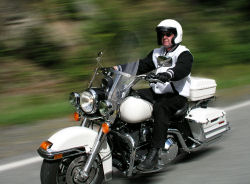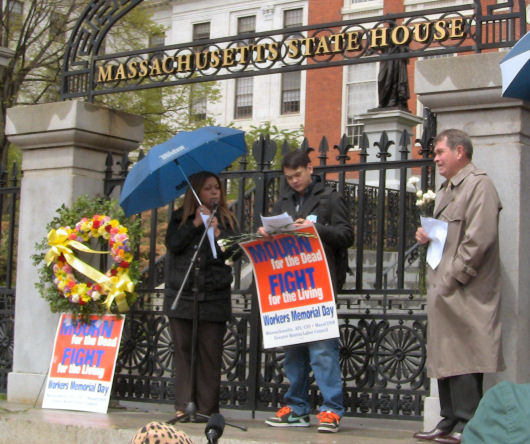Mass Commuter Challenge and Bay State Bike Week Remind Us to Pay Attention on Roads
Commuters across the state have been pedaling their way to work, the grocery store and other destinations all week as part of Bay State Bike Week and the Mass Commuter Challenge.
Commuters pledged to step out of their cars from May 17-21 and pedal 175,000 miles to workplaces from Worcester to Boston to Plymouth and across the rest of Massachusetts.
The challenge was organized to promote a healthy, non-polluting and sustainable means of transportation. Breakstone, White & Gluck supports this mission but hopes the Mass Commuter Challenge also highlights another important point: that as more bicycles take to the road, drivers and bicyclists must be more aware of each other for safety’s sake.
There are far too many bicycle accidents taking place on the roads today. In 2008, 716 bicyclists were killed across the country and an additional 52,000 were injured in traffic crashes, according to the National Highway Traffic Safety Administration. The NHTSA numbers show that 69 percent of bicycle accidents occured in urban areas and 28 percent of accidents occured between the hours of 5 p.m. and 9 p.m. The majority of the accidents occured in June (9 percent) and September (12 percent).
What Drivers Can Do to Improve Safety
The laws have changed significantly in the last year. Drivers have many more responsibilities to avoid injuring bicyclists. The first step is to be aware that you need to check twice for a cyclist. When overtaking cyclists, you cannot turn right unless there is adequate room, and you must yield to on-coming cyclists when turning left. When passing, you must do so at a safe distance. And remember to pay attention even after you turn off your motor vehicle’s engine. Under Massachusetts bike safety laws, motorists and their passengers can be fined up to $100 for opening car and truck doors in the path of a bicyclist.
A final tip: Put down that cell phone and concentrate on the road!
What Bicyclists Can Do to Improve Safety
Bicyclists can remember that bright colored reflective clothing and helmets save lives. Massachusetts only requires individuals age 1 to 16 to wear helmets, but we advise adults to wear them as well to avoid head injuries. Cyclists must obey the same rules as automobiles when on pubic ways. One of the biggest causes of accidents to cyclists: traveling the wrong way on a one-way street.
For more information about events in Boston and the Springfield area, visit www.masscommuterchallenge.org or www.massbike.org.
Read More
Consumer Safety Alert: 1.8 Million Plastic Toys Recalled from Family Dollar Stores

The U.S. Consumer Product Safety Commission (CPSC) has announced the voluntary recall of 1.8 million toy dart gun sets sold at Family Dollar Stores after they were involved in the asphyxiation deaths of two young boys.
The CPSC issued the recall in cooperation with the Charlotte, North Carolina discount store. The importer, Henry Gordy International, Inc., of Plainfield, N.J. refused to recall the soft, plastic toy, which poses a risk if a child places it in his mouth. The defective toy can be inhaled into the throat and prevent a child from breathing. The toy was sold exclusively through Family Dollar Stores from September 2005 through January 2009 for about $1.50.
“Parents should take these toys out of their child’s hands immediately,” said Massachusetts personal injury attorney David W. White of Breakstone, White & Gluck in Boston. “Given the size of this recall, you really want to take a minute to look through your toy bin if you do any shopping at the Family Dollar Stores.”
A 9-year-old boy in Chicago, Illinois and a 10-year-old boy in Milwaukee, Wisconsin suffered asphyxiation deaths while playing with the toy, which was manufactured in China. No Massachusetts consumer safety problems have been announced.
Consumers should discard the toys or return them to a Family Dollar store for a full refund. For additional information, contact Family Dollar at (800) 547-0359 between 8 a.m. and 5 p.m. ET Monday through Friday, or visit the firm’s website at www.familydollar.com.
For more information, read the U.S. Consumer Product Safety Commission’s recall. announcement.
Lettuce Recall Affects 23 States, Including Massachusetts
Another recent recall of fresh produce highlights the importance of safe food handling and rinsing even pre-washed produce. Freshway Foods of Ohio has announced a voluntary recall of romaine lettuce after reports of food borne illnesses from possible E.coli contamination. The New York State Public Health Laboratory found E.coli 0145 in an unopened recalled bag of shredded romaine. Products affected include bags of shredded romaine lettuce with “best if used by” dates prior to May 12; bags with “best if used by” dates of after May 12 are not affected. Freshway Foods sold the recalled products to wholesalers, food service outlets and some in-store deli and salad bars in Alabama, Connecticut, Washington DC, Florida, Georgia, Illinois, Indiana, Kansas, Kentucky, Maryland, Massachusetts, Michigan, Missouri, New Jersey, New York, North Carolina, Ohio, Pennsylvania, Rhode Island, South Carolina, Tennessee, Virginia, West Virginia, and Wisconsin. Although these products are now off the shelves, consumers should make sure they throw away any remaining products in their homes.
Nineteen cases of illness resulting from E.coli 0145 have been reported from Michigan, New York, and Ohio; twelve of these cases required hospitalization. Symptoms of foodborne illness caused by E.coli can range from nothing to acute stomach cramps and diarrhea to kidney damage. Three of the reported cases involved a life threatening complication called hemolytic uremic syndrome which causes blocked circulation or bleeding in the brain or kidneys. People experiencing a diarrheal illness with high fever, bloody stool, prolonged vomiting that could cause dehydration, symptoms of dehydration, or if the diarrheal illness lasts longer than three days should seek medical attention.
How to Protect Yourself
Consumers can protect themselves from foodborne illness by taking simple precautions. Cook meat and eggs thoroughly, using an internal thermometer. Avoid cross contamination by keeping raw meat and eggs away from vegetables and cooked foods and washing all surfaces that come into contact with raw products thoroughly. Chill leftovers promptly if they are not going to be eaten within four hours. Handle produce with clean hands and always rinse produce, even produce that has been pre-washed, and remove the outer leaves of lettuce and cabbage. Finally, report incidents of foodborne illness to your local health department.
For more information on this specific recall, read this article on Time.com. For more information about foodborne illnesses in general, see the CDC web pages on food safety. For more information on E.coli specifically, see the CDC’s web page on E.coli.
Aging Motorcyclists Face Greater Risk for Injuries
Baby boomers are taking to the open road on motorcycles at greater rates than ever before and as they do, their personal injuries and fatalities resulting from motorcyle accidents are increasing.
The American Motorcyclist Association reports its average membership age is now 48. The Motorcycle Industry Council trade association, meanwhile, reports the average age of all motorcycle owners increased from 33 to 40 years old between 1998 and 2003.
 The Massachusetts Department of Public Health reports the rate of motorcycle-related deaths and injuries in the state for riders between 55 and 64 quadrupled between 1998 and 2007. Additionally, although nationally there was a decline in motorcycle related fatalities regardless of age, Massachusetts experienced an increase in fatal motorcycle crashes.
The Massachusetts Department of Public Health reports the rate of motorcycle-related deaths and injuries in the state for riders between 55 and 64 quadrupled between 1998 and 2007. Additionally, although nationally there was a decline in motorcycle related fatalities regardless of age, Massachusetts experienced an increase in fatal motorcycle crashes.
The state Department of Public Health is not the only one to notice a correlation between age and severity of injury. Researchers at the University of Rochester Medical Center recently found that motorcyclists over the age of 40 sustained more serious personal injuries, spent more time in the hospital, and were up to twice as likely to die from a motorcycle accident than riders under 40.
Dr. Mark Gestring, the lead author of the study and director of the trauma center, noticed older riders and more severe injuries in the emergency room. His research team examined records in the National Trauma Databank and noted several disturbing trends:
- Riders over 40 were 5% more likely than riders under 40 to require hospitalization in the intensive care unit.
- Riders over 40 were more likely to suffer complications such as blood clots, pneumonia, or infections.
The Johns Hopkins Bloomberg School of Public Health found a 145% increase from 2000 to 2006 in death rates for motorcyclists over 65.
Doctors report that there are several factors accounting for the increased severity and fatality of injuries sustained by older riders. First, older riders have less resilient skin, bones and blood vessels and cannot handle as much physical trauma as their younger counterparts. Additionally, older riders come into the hospital with more preexisting heath problems and take more medications that can complicate injuries.
For more information, read this recent Boston Globe article about aging motorcyclists in Massachusetts.
Read More
Parents Advised to Check Medicine After Children Tylenol Recall
Parents are advised to stop using 43 popular over-the-counter medications for children following a widespread product safety recall involving liquid Tylenol, Motrin and Benadryl.
McNeil Consumer Healthcare, a division of Johnson & Johnson, voluntarily recalled the medications last Friday after the Food & Drug Administration (FDA) uncovered manufacturing deficiencies at the company’s plant in Fort Washington, Pennsylvania.
The product safety recall impacts consumers in Massachusetts, the rest of the United States, U.S. territories and nine other countries.
“While Tylenol has historically been a safe and effective product for children, parents are urged to use particular caution in giving it to their children at this time based upon the information received from the FDA,” Boston attorney Ronald Gluck said.
McNeil said some of the recalled products may contain a higher concentration of the active ingredient than is specified while others may contain inactive ingredients that do not meet internal testing requirements. Other medications may contain tiny particles.
The FDA advised parents to discontinue use of the recalled medications, although said it was unaware of any reports of illness. A spokesman for McNeil told The New York Times this weekend the company had received consumer complaints involving some of the recalled medications, but the recall was not issued on “the basis of adverse medical events.”
McNeil has suspended production at the facility while the FDA investigates.
The recalled medicines include various flavors of liquid Tylenol, Motrin and Benadryl for children and infants. Several types of children’s Zyrtec were also recalled.
The FDA advised parents to ask their pharmacists for alternative medicine options and cautioned them against giving adult versions of medications to children. Consumers with the recalled medications can also obtain a refund or coupon from the McNeil Product Recall website.
Read the full McNeil Product Recall list here.
McNeil has been involved with three major Tylenol recalls since 2008. In January, the company removed 51 types of Tylenol from the shelves after consumer complaints about vomiting, diarrhea and other symptoms. All but two of the recalled medications were for adults.The company said some of the medications had been contaminated by trace amounts of a chemical sometimes used for shipping and storage.
In 2008, McNeil recalled 21 types of children’s and infants’ Tylenol liquid products, saying an active ingredient did not meet all quality standards.
Read More
Massachusetts Workers Rally for Safety and to Commemorate Fallen Workers
Massachusetts workplace accidents and the lives they claim were the focus today at the Workers’ Memorial Day Commemoration and Rally at the Massachusetts State House. The event honored the 62 workers killed on the job in Massachusetts last year. Organizers called for workplace safety improvements to prevent more injuries and deaths.
The names of the victims of workplace accidents were read aloud at the beginning of the rally, and a moment of silence honored the men and women, as well as their families.

In a report on Massachusetts workplace accidents released today, the Massachusetts Coalition for the Occupational Safety and Health (MassCOSH) said for every worker killed on the job, 10 more die from occupational disease. Massachusetts workplace accidents resulting in death in 2009 included:
- 6 servicemen and women who died as a result of the war in Iraq
- 9 construction accident deaths
- 7 fishing accident deaths
- 11 deaths among Massachusetts firefighters
- 11 transportation accident deaths
- 6 workplace violence deaths
MassCOSH, which co-sponsored today’s rally with the Massachusetts AFL-CIO and the Greater Boston Labor Council, estimated 1,800 Massachusetts workers were diagnosed with cancers caused by workplace exposures last year. Another 50,000 Massachusetts workers reported serious personal injuries.
There are currently several efforts to prevent Massachusetts workplace accidents. Last Workers’ Memorial Day, Governor Deval Patrick issued an executive order establishing health and safety committees in all state agencies. But MassCOSH said a glaring problem that still must be changed is that Massachusetts’ public sector employees are not covered under the federal Occupational Safety and Health Act (OSHA) like private sector workers.
Among other recommendations, MassCOSH calls on the state to be more proactive and to protect temporary workers by passing the Employment Agency Bill (Senate Bill 2364). This bill will require employment agencies to provide written notice about key details of job assignments, the work site employer, the type of work to be done, the right to workers’ compensation and other important information. We believe this bill is especially important in light of this economic time.
MassCOSH’s complete report is titled, “Dying for Work in Massachusetts: Loss of Life and Limb in Masachusetts Workplaces.” It is available from MassCOSH.
Boston attorney David White (below) attended the rally on behalf of the firm.

Breakstone, White & Gluck, a Massachusetts workplace accident law firm, supports MassCOSH and its work to improve Massachusetts workplace safety, inspections and enforcement.
Massachusetts Personal Injury Lawyer David White on Money Matters Radio Network
David White, a principal at the Boston personal injury law firm of Breakstone, White & Gluck, recently appeared on Money Matters Radio for their mid-day show. Here is the audio from the presentation.
David talks about what car insurance you should have to protect yourself, and others, in the event of a car accident; about medical malpractice; and about insurance bad faith in Massachusetts.
To download the broadcast, click here.
Many thanks to our good friends at Money Matters Radio and host Chris Findlen.
Massachusetts Safety Tips for Enjoying the Warm Weather
As it finally cracks 50 degrees and Massachusetts residents get their first taste of spring, everyone is heading outside. Enjoy the nice weather tending to the yard and pedaling your bike, but don’t forget to avoid personal injuries. Here are some ways you and your family can avoid personal injuries:
On a hot humid Boston day, a swimming pool can be an oasis. However, swimming pools can be hazardous for young children. Adults should keep a close eye on children, whether in or near the water. Home pools should be surrounded by a fence that is at least 5 five feet high and self latches. When not in use, the pool fence should be locked. Keep the area around the pool free of clutter that can cause someone to trip. Poolside rescue equipment- such as 10-12 foot rescue pole and a ring buoy with line-should be kept close by. Keep a life vest close by and outfit all poor swimmers with a life vest. Be aware that the suction from pool drains can entrap swimmers underwater. Finally, keep pool chemicals in a safe place, out of reach of children.
Lawnmower Safety
Lawnmower safety starts with the proper shoes. Although it feels great to slip into sandals after months in boots, always wear sturdy shoes when operating a lawnmower along with eye and hearing protection. The next rule of lawnmower safety is to survey the yard for sticks, stones, and other objects that can go flying when struck by a lawnmower blade. Use a mower that will stop moving forward and will stop the blades’ movement if the handle is released. Wait for the blades to stop before crossing a street or trying to remove the grass catcher or discharge chute. Start and refuel motors outside on the yard, rather than in the garage. Finally, never let children under 12 operate a handheld mower or under 16 operate a ride-on mower.
Bicycle Safety
Adults and children alike should wear helmets when riding bikes. Helmets prevent serious injuries and can keep a bike accident from being a fatal accident. Helmets should be worn level on the head with the chin strap secured so the helmet cannot move. Also, when purchasing a bike for your child, make sure the bike is the right size for the child. An oversized bike can be hard to control and dangerous.
Playground Safety
Anyone who has ever fallen off a slide or slipped off the monkey bars knows there are significant risks for personal injuries at the playground. Always keep a watchful eye on children. If putting together playground equipment, make sure the equipment is assembled according to instructions and weighted to the ground. Periodically check for loose, rusted, or sharp pieces. Install safety padding, mats, or soft fill material beneath playground equipment, extending out six feet on all sides. Do not allow children to attach ropes to the playground equipment to avoid strangulation hazards and accidents if the rope comes loose. Make sure walls and fences are at least six feet away from all playground equipment.
For more tips on keeping your family safe this spring and summer, see the following websites:
Home Safety Council (Pool Safety)
US Consumer Product Safety Commission (Pool Safety)
Department of Transportation (Bike Safety)
HealthyChildren.Org (Lawnmover Safety)
Boston Bike Safety Gets Much-Needed Attention During Summit
Boston bicycle safety has markedly improved over the past two years with several new safety initiatives, including the creation of new bike lanes, publication of the city’s first biking map and installation of hundreds of bike racks.
But Boston bike safety is back in focus this month after three bicycle accidents within the city, including one fatal bike accident that claimed the life of a 22-year-old cyclist and another causing serious personal injuries.
“The biggest problem compared to other cities I’ve ridden in … whether people are biking, walking or driving around the city, everyone has this ‘me first’ attitude,” David Watson, executive director of the Massachusetts Bicycle Coalition, recently told the Boston Metro newspaper. “That’s a huge issue – changing the way everybody thinks.”
We applaud Boston Mayor Thomas M. Menino for calling the city’s first Bicycling Safety Summit after the accidents to provide bicyclists and city officials a chance to discuss ways to prevent bicycle accidents in Boston.
The reality is that both drivers and bicyclists need to take responsibility for co-existing with each other, along with walkers. This means education, especially considering the fact that the laws governing bicycling were amended by the Massachusetts legislature in 2009. Drivers still need to learn their new responsibilities when overtaking cyclists, when turning, and when opening doors in traffic.
For anyone thinking about enjoying the city on two bicycle wheels this summer, we encourage you to register for one of the Massachusetts Bicycle Coalition’s upcoming bike safety classes on May 6 or May 19 at City Hall. The move could save a life.
Our firm supports cycling programs and bicycle safety in Massachusetts. We are proud supporters of MassBike, the Northeast Bicycle Club, the Charles River Wheelmen, Bikes Not Bombs and the New England Mountain Bike Association.
Boston Personal Injury Attorneys Urge Residents to Seek Loaner Lexus SUVs As Toyota Conducts Retesting Following Safety Warning
As Toyota suspends sales of the 2010 Lexus GX 460 amid motor vehicle safety questions, concerned drivers can find relief by requesting a loaner sports utility vehicle.
Toyota – already forced recently to recall 2.3 million vehicles over motor vehicle safety defects – halted sales this week after Consumer Reports issued a “Don’t Buy: Safety Risk,” warning because tests revealed handling problems with the electronic stability control. The magazine is concerned about potential motor vehicle accidents and motor vehicle rollovers. No motor vehicle accidents involving personal injuries or deaths have been reported, but the magazine’s “don’t buy” warning is its first in nearly a decade for a motor vehicle.
“Drivers are facing an extraordinary number of recalls, mostly from Toyota,” said Boston personal injury attorney David W. White of Breakstone, White & Gluck. “Massachusetts residents should immediately seek repairs or loaner vehicles to protect themselves, their families, and other drivers.”
Lexus will provide a loaner vehicle for any customer who has bought a 2010 Lexus GX 460 since the vehicle’s December release. Customers can call Lexus at 800-255-3987. Lexus has sold about 5,000 vehicles since the Lexus GX 460 was released.
Toyota has suspended sales and production of the Lexus 460 as it tests all its Lexus and Toyota SUVs following the Consumer Reports warning. The carmaker said its engineers previously found no issues with motor vehicle safety, but are now trying to duplicate Consumer Reports’ testing to correct the product safety rating.
Toyota recalled 2.3 million vehicles in January for a so-called “sticky pedal defect.” The National Highway Traffic Safety Administration (NHTSA) is now seeking the maximum civil penalty of $16.375 million against Toyota for failing to notify the government agency for at least four months about the product safety defect. Government officials say company officials knew about the potential risk to consumers.
The penalty being sought against Toyota would be the largest civil penalty ever assessed against an auto manufacturer by NHTSA.
For assistance with a product liability case or case involving a wrongful death or personal injury, contact the experienced attorneys at the Boston firm of Breakstone, White and Gluck. The lawyers have over three decades of experience with motor vehicle accident lawsuits and truck accident lawsuits. To consult with a professional and experienced attorney, call 800 379 1244.

